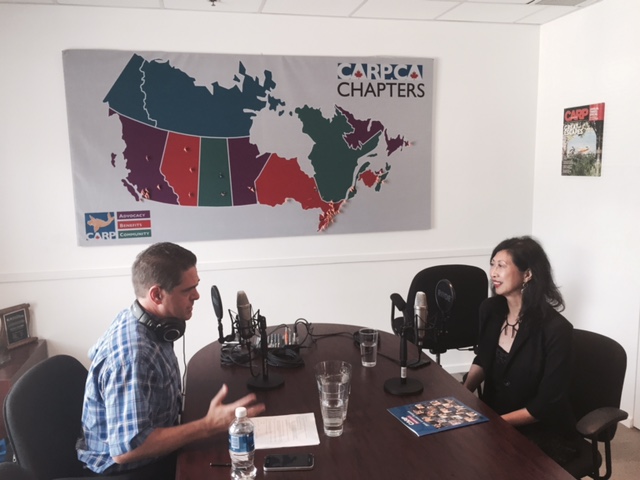Below is a summary of a segment that was featured on Debt Free in 30 radio show that aired on 7 radio stations [September 12] in which Susan Eng, VP of Advocacy at CARP discusses with show host Douglas Hoyes the many financial considerations that seniors have to make, noting that their fears include outliving their savings and their children’s and grandchildren’s lack of economic opportunities. Eng describes the need for government reform and options for reducing senior’s debt levels. Click here to listen to the podcast and read the interview summary.
On today’s show I talk with Susan Eng, Vice President of Advocacy at CARP, an organization focused on helping seniors and future generations with issues like financial security. Susan explains that studies like our Joe Debtor whitepaper, catalogue the fears that seniors have today; fears about outliving their savings and their children’s and grandchildren’s lack of economic opportunities. During our talk, she describes the need for government reform and options for reducing senior debt levels.
Short-term Vs. Long-term Changes
Susan explains that for senior poverty levels to improve, there are things that the government can change both on a short-term and long-term level. In the short-term, things like affordable access to medication, housing and income will improve the lives of Canadian seniors. In the longer term, pension plan reform and savings opportunities will help future generations as they age.
Although senior poverty rates have declined in recent years, Susan warns that inactivity could lead to an increase in those numbers as younger generations get older. She points out that, our poverty rate among people 65 and older, according to Stats Can – using the low income measure – is 12%; meaning 600,000 people in Canada today who are age 65 and older are living in poverty.
At age 65, fewer economic opportunities and a fixed income make it difficult to keep up with growing expenses and ever-decreasing savings accounts. As Susan points out, the senior population is not one homogeneous group; there are both wealthy and financially burdened groups throughout Canada. CARP focuses on helping struggling seniors, but also those at risk for financial strain. It’s important to remember that a lot of times it’s the unexpected that really catches them.
Senior Debt in Canada
It’s easy to assume that seniors should be insulted from debt. By 65, shouldn’t we have enough saved up for retirement and have our big expenses, like our mortgage, paid off? Why would seniors need to spend money once they retire? Susan explains that this perception is wrong, stating that the general stereotype is that once you’re a senior, you stop living. You stop buying, you stop buying new houses, you stop getting a divorce. You just carry on wherever you were at, at 65; you just basically go into a static future.
While it may have been true that many years ago seniors retired without debt and limited their borrowing habits, today’s seniors are starting new relationships, getting divorced, starting businesses and new jobs – and they take on debt to do it. Once you hit 65, time and your finances don’t just freeze. With low interest rates and the ability to invest to try to fill an income gap, the opportunity to borrow money isn’t isolated to young Canadians.
Seniors Increasingly Turning To Payday Loans For Financial Support
One shocking finding from our Joe Debtor study was that the highest total dollar value owed on payday loans at the time of filing insolvency, was owed by seniors. Susan explains that one reason seniors are turning to alternative lenders is that banks will not offer traditional loans to those already in debt, with limited income streams and assets that they stand to lose. One solution that we discuss is to bring back micro-credit as a way to offer smaller loans to individuals who might not qualify for traditional larger loans.
Moreover, Susan asserts that low interest rates are making seniors vulnerable to financial problems because their money is not earning anything sitting in the bank. To combat this, seniors are turning to alternative lenders and riskier investment options to try to maximize their earning potential or to supplement their fixed income; often leading to negative results. Instead, Susan suggests that the government create opportunities for savings such as increasing CPP and making medications, home care and housing more affordable for seniors.
The take-away message is that we need to start planning for retirement early. Being proactive about dealing with debt as soon as possible and growing your savings to ensure that you won’t outlive your cash flow is essential. While organizations like CARP are working to create change throughout Canada, it’s important to assess your own financial future so that you can make a plan early to avoid taking on debt that you can’t pay back, once you retire.
Listen to the full podcast or read the full transcript here to hear more about:
- The impact that health-related issues can have on an individual’s finances.
- CARP’s lobbying successes and why elections are opportunities for change.

